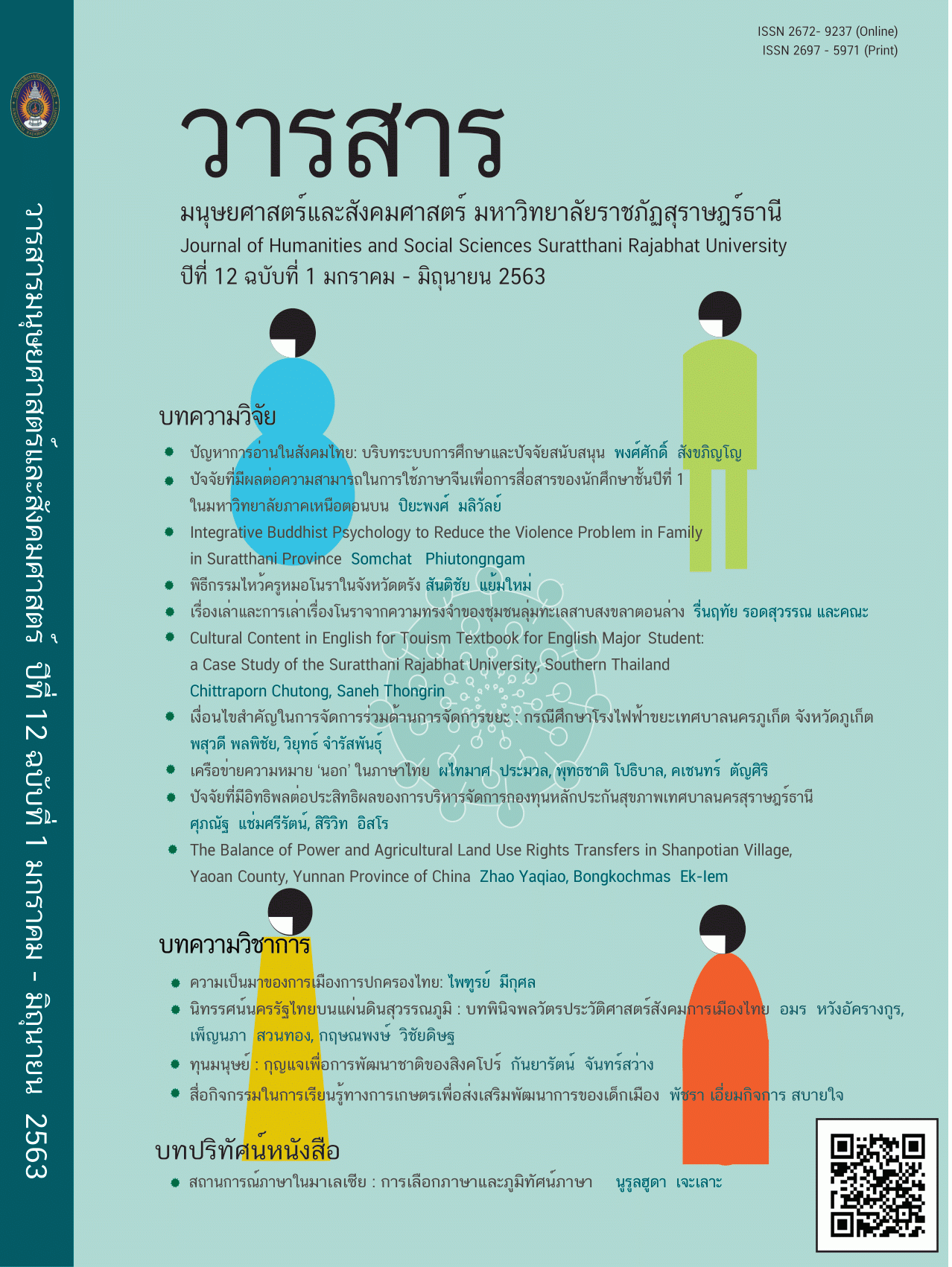Integrative Buddhist Psychology to Reduce the Violence Problem in Family in Suratthani Province
Main Article Content
Abstract
This objectives of this research were: 1) to study and analyze the problems of family violence in Suratthani Province 2) to study and analyze Buddhist psychology and Carl Rogers’ psychology and 3) to study and
analyze integrative Buddhist psychology to reduce the problem of family violence in Suratthani province. This research was conducted in Suratthani province, using qualitative research methodology. The data were collected from 24 informants who were heads of families and had never used violence in their families by means of in - depth - interviews and from 9 participants, using focus group discussion. Both data were analyzed and synthesized according to the research objectives.
The results of this research found that 1) the problems of family violence in Suratthani Province that happened in many districts involve the following kinds of family violence: 1) injury or death 2) rape and sex gangbang 3) detention and mental offence. The causes of family violence problems include infidelity, jealousness, alcohol drinking, drug addiction, economic problems and unemployment, borrowing money, destructive habits and gambling. The family violence happening in Suratthani province has effects in terms of economic, social and public health sides. 2) Buddhist psychology is the concept of mind bringing a heart of important Buddha dhamma such as the Noble Eightfold Path and the Four Noble Truths to solve problems and to develop mind qualitatively. Counseling Psychology according to Carl Rogers’s concept consists of three important basic concepts, namely 1) to understand human nature 2) to
develop balance of self and 3) true love. 3) Regarding Integrative BuddhistPsychology to reduce problems of family violence in Suratthani province, the persons acting as a family leader have to persist in and follow theprinciples of Buddhist psychology and Carl Rogers’s counseling psychology together with using logic and without using emotion, to be a good model for the family and to give counsel to family members who encounter problems
Article Details

This work is licensed under a Creative Commons Attribution-NonCommercial-NoDerivatives 4.0 International License.
All published manuscripts have been verified by peer-peer professors in the fields of humanities and social sciences. Reprinting of the article must be authorized by the editorial staff.
References
Benjang Keangsunthara. (2013). The Strategy for management of violence in
Thai family. Doctor of Philosophy Degree, Social, Business and
Political Leader. PaThumThani: Rangsit University.
Chomphunuth Srichannil. (2009). Buddhist psychology: The way to heal
suffering and cultivate mental health. Academic Journal of Thai
chamber of commerce university. 29 (4), 189-208.
Department of Administration. (2013). Annual population statistics
Announcement. [Online]. Retrieved from http: //www.Pab.dopa.
go.th/mmenu1.html. [2014, July 2].
Jiraphorn Tongkittipaphorn. (2016). Personality psychology and health
behavior. Bangkok : Publisher of Chulalongkorn university.
Kanchana heze. (2013). How to solve the problem of youth violence
with the Eightfold Path: A Case study of Ban Nong Kung Non
Than School Nong Song Hong District Khon Kaen. Thesis of Master
of Arts, Buddhism. Phra Nakorn Sri Ayutthya: Mahachulalongkornrajavidyalaya
University.
Komchadluek. (2018). The house is not a boxing ring. Family violence
statistics jumped 83%. [Online]. Retrieved from http://www.
komchadluek.net/news/regional/336694. [2018, September 1].
Panjaphat Wannapiboon. (2014). Family violence: synthesis, causes and
Solving problems with local wisdom in Isan. Doctor of Philosophy
Degree, Cultural Sciences. Mahasarakam: MahasarakamUniversity.
Phongphan Ponsopa. (2000). Theory and technique of counseling. (2nd ed).
Bangkok : Tanatach Printing Company.
Phrachan Talooping. (2013). Family violence management according to
Buddhism principles. Master of Arts Thesis, Program in Buddhist
Studies. Chiang mai: Chiang Mai University.
Preecha Upayokin. (1995). The way of analysis violence problem in family.
Journal of Sukhothaithammathirat. 8 (3), 98-107.
Somchat Phiuthongngam and Sitthichai Chivaroros. (2016). Violence Problem
in Suratthani Province. Journal of Humanities and Social Sciences,
Suratthani Rajabhat University. 8 (1), 133-157.
Sririwat Srikruedong and Member. (2016). Buddhist Integrative Psychology:
Concepts and Modeling to reduce rates of Adolescent suicide in
Thai society. Faculty of Humanities Research Project,
Mahachulalongkornrajavidyalaya University.
Vichuda Thitichotrattana. (2016). The development of Buddhist psychology
integration model of the Buddha Consultation role. Doctor of
Philosophy Degree, Buddhist Psychology. Phra Nakorn Sri Ayutthya:
Mahachulalongkornrajavidyalaya University.
Yongyuth Saenprasit. (2011a). Family violence and prevention at the
community level Journal of Applied Arts. 17(2), 34-37.
Yongyuth Saenprasit. (2011b). Study of patterns of prevention of Family violence by
process family and community participation: A case study of a
community in Pathumthani province. Doctor of Philosophy, Applied
Behavioral Science Research. Bangkok: Srinakharinwirot University.


